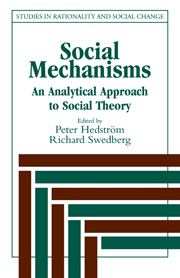Book contents
- Frontmatter
- Contents
- ACKNOWLEDGMENTS
- LIST OF CONTRIBUTORS
- 1 Social mechanisms: An introductory essay
- 2 Social mechanisms and social dynamics
- 3 A plea for mechanisms
- 4 Real virtuality
- 5 Concatenations of mechanisms
- 6 Do economists use social mechanisms to explain?
- 7 Social mechanisms of dissonance reduction
- 8 Social mechanisms without black boxes
- 9 Is sociological theory too grand for social mechanisms?
- 10 Theoretical mechanisms and the empirical study of social processes
- 11 Monopolistic competition as a mechanism: Corporations, universities, and nation-states in competitive fields
- 12 Rational imitation
- AUTHOR INDEX
- SUBJECT INDEX
9 - Is sociological theory too grand for social mechanisms?
Published online by Cambridge University Press: 24 March 2010
- Frontmatter
- Contents
- ACKNOWLEDGMENTS
- LIST OF CONTRIBUTORS
- 1 Social mechanisms: An introductory essay
- 2 Social mechanisms and social dynamics
- 3 A plea for mechanisms
- 4 Real virtuality
- 5 Concatenations of mechanisms
- 6 Do economists use social mechanisms to explain?
- 7 Social mechanisms of dissonance reduction
- 8 Social mechanisms without black boxes
- 9 Is sociological theory too grand for social mechanisms?
- 10 Theoretical mechanisms and the empirical study of social processes
- 11 Monopolistic competition as a mechanism: Corporations, universities, and nation-states in competitive fields
- 12 Rational imitation
- AUTHOR INDEX
- SUBJECT INDEX
Summary
Introduction
Nomothesis is definitely out. There is, in fact, some question whether it ever existed to begin with, even in principle. Not even Auguste Comte, the original positivist arch-generalizer himself, really meant all that stuff about ineluctable “laws” and “stages, ” it now turns out (Scharff 1995). He was, in effect, a “post-positivist” avant la letter. Talk about being ahead of one's time!
Idiography is all the rage. If there is anything that characterizes the general drift of sociological theory since the eclipse of Parsonian structural functionalism and its marxisant challengers, it is the revitalization of all manner of interpretivist microsociological approaches, from symbolic interactionism to various forms of phenomenology, from hermeneutics to ethnomethodology.
Against such odds, what is the aspiring social theorist to do? One option is to join the swelling postmodern chorus of denouncers of generalization tout court. But once the initial excitement of being up against the nasty establishment and on the side of the downtrodden wears off, such denunciation leaves little to satisfy one's generalizing yearnings.
Another option is once again to attempt the Grand Synthesis. In this chapter, I will argue that this is precisely what the most prominent of the present generation of social theorists have done. They have taken it upon themselves to bridge the gulf between the nomothetic, macrosociological, “structural” traditions of yore and the currently fashionable idiographic, microsociological, voluntaristic (“agentic”) approaches. In the process, so I will argue, a third option, the systematic search for explanatory mechanisms advocated in this volume, never stood a chance.
- Type
- Chapter
- Information
- Social MechanismsAn Analytical Approach to Social Theory, pp. 204 - 237Publisher: Cambridge University PressPrint publication year: 1998
- 19
- Cited by



